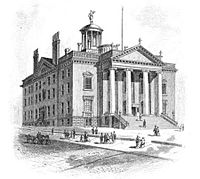71st New York State Legislature
| 71st New York State Legislature | |||||
|---|---|---|---|---|---|
|
|||||

The Old State Capitol (1879)
|
|||||
| Overview | |||||
| Jurisdiction | New York, United States | ||||
| Term | January 1 – December 31, 1848 | ||||
| Senate | |||||
| Members | 32 | ||||
| President | Lt. Gov. Hamilton Fish (W) | ||||
| Party control | Whig (24-8) | ||||
| Assembly | |||||
| Members | 128 | ||||
| Speaker | Amos K. Hadley (W) | ||||
| Party control | Whig (93-35) | ||||
| Sessions | |||||
|
|||||
| 1st | January 4 – April 12, 1848 |
|---|
The 71st New York State Legislature, consisting of the New York State Senate and the New York State Assembly, met from January 4 to April 12, 1848, during the second year of John Young's governorship, in Albany.
Under the provisions of the New York Constitution of 1846, 32 Senators were elected in single-seat senatorial districts for a two-year term, the whole Senate being renewed biennially. The senatorial districts (except those in New York City) were made up of entire counties. 128 Assemblymen were elected in single-seat districts to a one-year term, the whole Assembly being renewed annually. The Assembly districts were made up of entire towns, or city wards, forming a contiguous area, all in the same county. The City and County of New York was divided into four senatorial districts, and 16 Assembly districts.
On September 27, the Legislative passed "An Act to provide for the electioon of a Lieutenant Governor", to fill the vacancy caused by the resignation of Addison Gardiner.
At this time there were two major political parties: the Democratic Party and the Whig Party. The Democratic Party was split into two factions: the "Barnburners" and the "Hunkers." The radical abolitionists appeared as the Liberty Party. The Anti-Rent Party nominated some candidates, but mostly cross-endorsed Whigs or Democrats, according to their opinion on the rent issue. The Native American Party (later better known as "Know Nothings") also ran.
The New York state election, 1847 was held on November 3. Hamilton Fish (W) was elected Lieutenant Governor; and all the other eleven statewide elective offices were won by the Whigs.
24 Whigs and 8 Democrats were elected to the State Senate. 93 Whigs and 35 Democrats were elected to the Assembly.
...
Wikipedia
